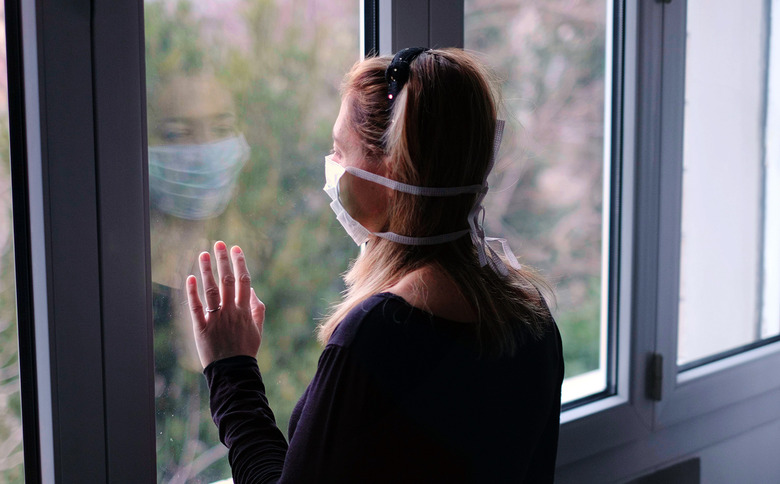A Frightening New Coronavirus Symptom Is Puzzling Doctors
- A bizarre new coronavirus symptom is puzzling doctors, who can't yet explain how or why the pathogen operates.
- Some patients who tested positive for coronavirus reported ringing in the ears, sometimes followed by hearing loss.
- Hearing may return after treatment with steroids, but the ringing might remain.
- Doctors think the virus impacts the ear via tiny blood vessels, as COVID-19 is known to cause blood clots in the body.
The breadth of research targeting the novel coronavirus is one of the highlights of the pandemic. The virus is still winning and we might be looking at more than a year until the pandemic is defeated, but scientists have made tremendous progress at an incredible pace. The virus was quickly sequenced and geneticists proved SARS-CoV-2 evolved naturally in animals before jumping to humans. Also, the early availability of the genome allowed the first COVID-19 vaccine trials to start just a few months after the pandemic began. Researchers have also analyzed the virus's survivability on various surfaces and were quick to provide evidence that the virus spreads mainly through the air. Separately, doctors treating patients with COVID-19 have come up with effective treatments that have moved rapidly to clinical trials. We saw several notable successes (remdesivir, dexamethasone, blood thinners) and a few disappointments along the way (hydroxychloroquine, tocilizumab, Kaletra). And the coronavirus research effort is hardly over, as scientists still must try to explain the effects of the virus on the human body, which can be quite puzzling. The latest research looks into a scary COVID-19 symptom that doctors keep seeing in the wild, and they might finally have an explanation for it.
Some patients report ringing in their ears following the infection with the new pathogen, which can result in temporary or even permanent hearing loss. The first reports of this frightening symptom came during the summer, as researchers from the UK released the conclusions of their study detailing the condition.
Plenty of COVID-19 patients experienced ringing in the ears followed by hearing loss. CNN detailed two such cases over the weekend, including 42-year-old Meredith Harrell.
"It was like someone flipped a switch," she told CNN about the sudden loss of hearing in her right ear in July, which started ringing before she realized she couldn't hear anything at all out of that ear. Her positive diagnosis came a week later when she took a COVID-19 test. She had no other symptoms indicative of infection with the novel coronavirus, but an otologist told her it was probably the virus to blame for the hearing problems.
The symptom can appear even in younger patients. A 23-year-old student lost 70-80% of his hearing in the left ear after catching covid. Liam also exhibited other symptoms, including fever, headache, and fatigue. The tinnitus arrived as he started feeling better after weeks of symptoms.
High doses of steroids (like dexamethasone), which are already known to be effective against the virus, can help. They worked for Liam, who can now hear everything except for high tones — his tinnitus is still present and might never go away. But steroids might not make the problem go away in all patients. Harrell took steroids as well, but the treatment didn't work. Doctors told her that she's unlikely to get her hearing back and she will require a hearing aid. Her tinnitus might not disappear either.
Doctors still can't fully explain how the virus affects the inner ear. Other viruses like measles, mumps, and meningitis have similar effects on the ear.
One way to test whether the virus is attacking the inner ear is to perform a biopsy, but that's a risky procedure that can damage the tissue. A Johns Hopkins Medicine team led by Dr. Matthew Stewart performed autopsies of three patients who died of COVID-19 complications. They detected the virus in the middle ear and the mastoid bone, which is just behind the ear.
"Personally, I'm suspicious that [the novel coronavirus] has the potential to be worse," Stewart told CNN. He suspects that blood clotting is the culprit. Blood clotting is a dangerous COVID-19 symptom that can cause strokes and heart attacks. The same thing might happen in the small blood vessels in the inner ear. The full study is available at this link.
Kevin Munro, the researcher who co-authored the earlier study from the UK, thinks the theory makes sense. "The capillaries in the inner ear are the smallest in the human body, so it wouldn't take much to block them," he said. Munro and his team plan to conduct larger studies on hearing loss resulting from COVID-19.
